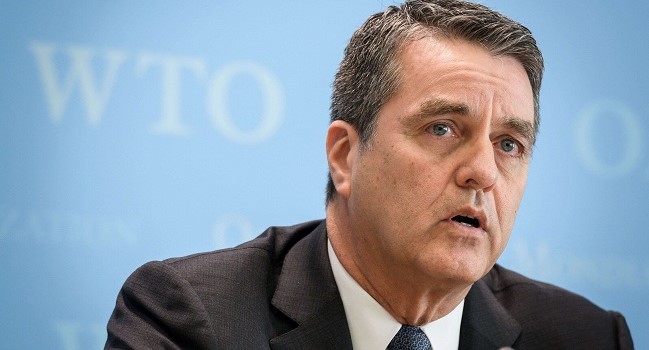Some 150 civil society, fisher and farmer groups and individuals from Nigeria and other developing countries are accusing the World Trade Organisation (WTO) of conducting negotiations on how to curb harmful fishing subsidies in a “non-inclusive and ad-hoc manner” during the coronavirus pandemic.

They have thus called for the talks to halt while the global health crisis rages. In fact, they urge Member States to discontinue participating in the process until it can be pursued in a “transparent, inclusive and rational manner, which is not possible unless normalcy is restored across the globe”.
“In the middle of this (the pandemic), the World Trade Organisation (WTO) is continuing to negotiate an outcome on fisheries subsidies in the most non-transparent, non-inclusive and ad-hoc manner,” the groups wrote to Roberto Azevedo, Director-General, WTO, in a correspondence dated April 1, 2020.
“Countries are busy attending to the unprecedented health calamity posed by COVID19, which represents a phenomenal challenge not only to our health but to the current & future economic, social, and political stability across our countries. Most countries are busy deploying their financial and human resources to fighting this monumental battle,” the group noted in the letter which is titled: “Call to Halt Fisheries Subsidies Negotiations in the Middle of the COVID 19 Crisis”
Since many developing countries are unable to participate in the ongoing discussions because of domestic disruptions, a somewhat defective process that seems to give undue influence to the Chair is being followed, tabling “biased texts”, the groups pointed out in the memo.
“Since Geneva is under a lockdown, face-to-face negotiations are on hold. Meanwhile, the Chair, Ambassador Santiago Wills of Colombia, is tabling texts at his own discretion, and the lack of adequate consultations is introducing undue bias in the text written by the Chair with the support of the WTO Secretariat, which remains under the heavy influence of some advanced countries,” the letter stated.
WTO members had sought to wrap up fisheries negotiations aimed at curbing the “harmful” fisheries subsidies, estimated at between $14 billion and $20.5 billion annually, at the ministerial meeting in Kazakhstan in June 2020. Although now the meet is unlikely to be held as scheduled because of the pandemic, attempts are still being made to conclude the talks.
The fisher and farmer bodies pointed out that the draft text tabled by the Chair on March 9, on overfishing and overcapacity, placed the Special and Differential Treatment (SDT), a key demand from a number of other developing countries and least developed countries (LDCs), under a placeholder.
Following strong objections from several developing countries, the Chair organised a virtual conference on March 20, which had to be cancelled as several developing countries were not able to participate, the representation added.
The Chair then called for written submissions through e-mails, which, too, was difficult for many countries. However, based on these, a new text is to be drafted.
“Negotiations of multilateral negotiations on an important issue such as fisheries subsidies, which is a critical livelihood issue for millions, especially in developing countries, cannot be conducted in this manner,” the groups stated, adding that the right thing to do amid the pandemic is to put the talks on hold.
In a reply dated Monday, April 6, 2020, Azevedo appeared to be wary, saying: “With regard to your specific requests about the future of the fisheries subsidies negotiations, it is important to understand that any action to halt or suspend negotiations is one that would need to be taken by WTO Members collectively. This is not something that is in the hands of myself or the Chair of the Fisheries negotiations, Ambassador Santiago Wills.”
He added: “In this regard, the mandate given to WTO Members by their ministers at MC11 was to finalise the negotiations by the following Ministerial Conference which would have been MC12, in June this year, which was in line with the 2020 deadline in SDG target 14.6. As you are aware, however, that conference has been postponed by Members because of the COVID-19 pandemic.
“Given this, how the fisheries negotiations should proceed, just like several other ongoing issues at the WTO, will need to be discussed among WTO Members themselves and an appropriate course of action decided upon.”
